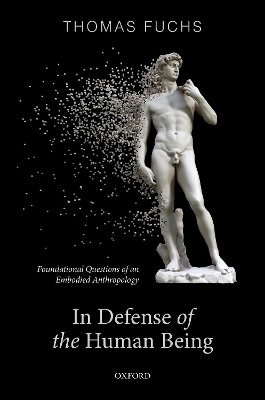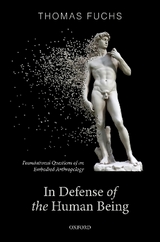In Defence of the Human Being
Oxford University Press (Verlag)
978-0-19-289819-7 (ISBN)
With the progress of artificial intelligence, the digitalization of the lifeworld, and the reduction of the mind to neuronal processes, the human being increasingly appears to be just a product of data and algorithms. That is, we conceive ourselves “in the image of our machines”, and conversely, we elevate our machines and our brains to new subjects. At the same time, demands for an enhancement of human nature culminate in transhumanist visions of taking human evolution to a new stage.
Against this self-reification of the human being, this book defends a humanism of embodiment: our corporeality, vitality, embodied freedom are the foundations of a self-determined existence, which uses these new technologies only as a means, instead of letting them rule us.
In Defence of the Human Being offers an array of interventions directed against a reductionist naturalism or transhumanism in various areas of science and society. As alternative it offers an embodied and enactive account of the human person: we are neither pure minds nor brains, but primarily embodied, living beings in relation with others. Fuchs applied this concept to issues such as artificial intelligence, transhumanism and enhancement, virtual reality, neuroscience, embodied freedom, psychiatry, and finally to the accelerating dynamics of current society which lead to an increasing disembodiment of our everyday conduct of life.
Cutting across neuroscience, philosophy, and psychiatry, this important new book applies cutting-edge concepts of embodiment and enactivism to the current scientific, technological and cultural tendencies that will crucially influence our society's development in the 21st century.
Thomas Fuchs, MD, PhD, is Karl Jaspers Professor of Philosophy and Psychiatry at Heidelberg University, Germany. His main areas of expertise include phenomenological philosophy and psychopathology as well as embodied and enactive cognitive science, with a particular emphasis on non-representational, interactive concepts of social cognition. He was Coordinator of several large national and international grants, among them the European Research Training Network “Towards an Embodied Science of Intersubjectivity” (TESIS). He has authored over 350 journal articles, book chapters and several books. He is Editor-in-Chief of “Psychopathology” and editorial board member of 4 scientific journals.
Introduction
Artificial Intelligence, Transhumanism, Virtuality
1: Human and Artificial Intelligence: A Clarification
2: Beyond the Human? A Critique of Transhumanism
3: The Virtual Other: Empathy in the Age of Virtuality
Brain, Person, and Reality
4: Person and Brain: Against Cerebrocentrism
5: Embodied Freedom: a Libertarian Conception
6: Brain World or Life World? Critique of Neuroconstructivism
7: Perception and Reality: Sketch of an Interactive Realism
Psychiatry and Society
8: Psychiatry Between Psyche and Brain
9: Embodiment and Personal Identity in Dementia
10: The Cyclical Time of the Body and the Linear Time of Modernity
References
Name Index
Subject Index
| Erscheinungsdatum | 24.11.2021 |
|---|---|
| Verlagsort | Oxford |
| Sprache | englisch |
| Maße | 162 x 240 mm |
| Gewicht | 598 g |
| Themenwelt | Geisteswissenschaften ► Philosophie |
| Geisteswissenschaften ► Psychologie | |
| Naturwissenschaften ► Biologie ► Humanbiologie | |
| Naturwissenschaften ► Biologie ► Zoologie | |
| ISBN-10 | 0-19-289819-1 / 0192898191 |
| ISBN-13 | 978-0-19-289819-7 / 9780192898197 |
| Zustand | Neuware |
| Informationen gemäß Produktsicherheitsverordnung (GPSR) | |
| Haben Sie eine Frage zum Produkt? |
aus dem Bereich




